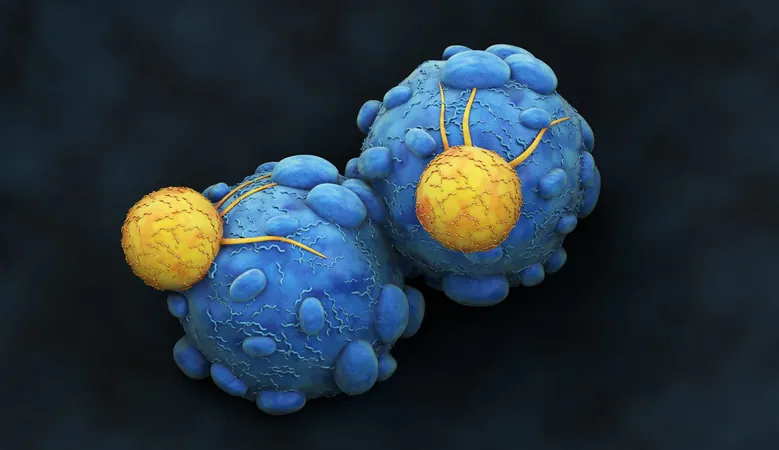
Revolutionary T Cells: Targeting Brain Tumors with Precision!
2024-12-06
Author: Michael
Introduction
In a groundbreaking advancement in cancer treatment, researchers have engineered cancer-fighting T cells that possess a unique two-tiered specificity. This cutting-edge technology equips the T cells with receptors fine-tuned to detect a protein exclusively found in central nervous system (CNS) tissue. Once these receptors are activated, the T cells release a tailored set of genetically encoded payloads aimed at combating various CNS ailments.
Promising Results
Promising results from mouse studies demonstrate the efficacy of these programmed T cells: they successfully attacked glioblastoma—a notoriously aggressive brain tumor—and alleviated inflammation related to multiple sclerosis. This pioneering research, conducted by a team at the University of California, San Francisco (UCSF) and spearheaded by prominent figures such as Dr. Scott S. Zamvil and Dr. Hideho Okada, is set to transition into clinical trials for glioblastoma patients in the near future.
Research Findings
The detailed findings were published in a recent issue of Science, under the article titled, "Programming tissue-sensing T cells that deliver therapies to the brain." In their exploration, the researchers identified specific antigens unique to the CNS, including components of the extracellular matrix and proteins found on neurons and glial cells. They utilized synthetic Notch receptors to smartly program T cells to express diverse therapeutic payloads exclusively within the brain.
Key Insights
“Our engineered CNS-targeted T cells have demonstrated remarkable efficiency,” the authors noted. “They cleared both primary and secondary brain tumors without adversely affecting similar cells outside of the CNS. Additionally, T cells programmed to deliver interleukin-10, an immunosuppressive cytokine, significantly reduced symptoms in mouse models of neuroinflammation.”
Targeting Mechanism
This innovative approach not only enhances the targeting capabilities of T cells but also represents a major leap forward in treating brain cancers, which have been historically challenging due to the blood-brain barrier that limits drug delivery. Traditional therapies like surgery and chemotherapy can be both risky and ineffective.
Molecular GPS
Dr. Wendell A. Lim, part of the UCSF team, compared the engineered T cells to having a "molecular GPS," which provides the immune cells with a precise "zip code" that directs them to the brain and identifies the tumor's exact location. This GPS system was centered around a protein called brevican, a key component of the brain's jelly-like structure that is unique to the CNS.
Dormant Cells
After successfully navigating through the bloodstream to locate and eliminate established brain tumors, these intelligent immune cells remain dormant, ensuring they do not attack tissues elsewhere in the body that share a similar protein signature.
Application in Neuroinflammation
In a further experiment, the team applied the brain-specific GPS technology to engineer T cells capable of delivering anti-inflammatory agents to combat conditions like multiple sclerosis. The engineered cells were successful in targeting and reducing inflammation in mouse models, showcasing the versatility of this approach.
Future Implications
“This revolutionary method promises an exciting future for brain cancer treatments. Glioblastoma is one of the most lethal forms of cancer, and our technique could offer patients a fighting chance,” Dr. Okada emphasized. As research progresses, millions afflicted by various neurological disorders—including cancer, brain metastases, autoimmune diseases, and neurodegenerative conditions—may one day benefit from targeted therapies like these.
Conclusion
Stay tuned as we follow the progress of this extraordinary technology that could change the landscape of brain disease treatment forever!









 Brasil (PT)
Brasil (PT)
 Canada (EN)
Canada (EN)
 Chile (ES)
Chile (ES)
 España (ES)
España (ES)
 France (FR)
France (FR)
 Hong Kong (EN)
Hong Kong (EN)
 Italia (IT)
Italia (IT)
 日本 (JA)
日本 (JA)
 Magyarország (HU)
Magyarország (HU)
 Norge (NO)
Norge (NO)
 Polska (PL)
Polska (PL)
 Schweiz (DE)
Schweiz (DE)
 Singapore (EN)
Singapore (EN)
 Sverige (SV)
Sverige (SV)
 Suomi (FI)
Suomi (FI)
 Türkiye (TR)
Türkiye (TR)